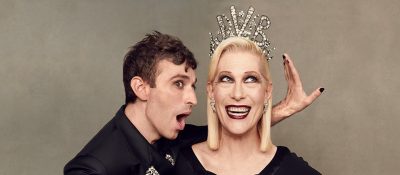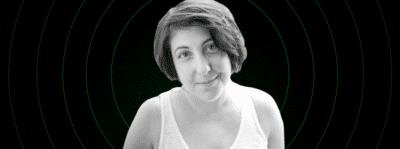Lip Critic (Photo by Justin Villar)
A night with Lip Critic: two synths, two drummers, a lot of noise and a mosh pit
The electro-punk quartet's raucous live show is starting to earn it fans across the globe
For reasons that are hard to articulate, Bret Kaser seems like someone who would’ve fit in perfectly behind the counter at a Blockbuster circa 1997. Perhaps it’s his chilled-out speaking voice, or the vague air of nerdiness his short blonde hair and glasses give off.
But on Thursday night, as the singer of his electronic punk-rap hybrid band Lip Critic, he was a rock star, rap king and DJ all rolled into one. The sold-out crowd at Elsewhere’s Zone One room swayed, hopped and outright moshed to his genre-defying bangers.
The band showed up with two electronic setups facing each other in the forefront of the stage and two drummers in the back who played with such ferocity that it’s a wonder their sticks survive a full set. Kaser sang and played the synth bass notes, while his co-songwriter Connor Kleitz played chords, arpeggios and more right across from him. On their full kits, Ilan Natter and Danny Eberle went from recreating the sounds and textures of drum machines to mashing away like they’re in a hardcore band.
Throughout their nonstop 40-minute set, Kaser at times rapped in a unique register (imagine Thomas Dolby sped up to breakneck speed), screamed and grunted like the singer of Disturbed. He climbed things near the stage. Multiple people — including, in a peak 2024 moment, one woman wearing a mask — crowd surfed.
The band’s innovative sonic mixture — and the diehard cult following they’ve been forming — has critics taking notice. London’s NME called the group “the next great NYC band” and gave them a digital cover story. Rolling Stone U.K. said their “fervent live show” will soon “be a thing of legend.” Paste called their latest single “pure ecstasy.”
Kaser, 25, who lives in Sunset Park, is just focused on the several records he wants to make. The group’s first full-length album, “Hex Dealer,” will debut May 17, and Kaser says they’re already almost done with a follow-up. “I would happily play Elsewhere Zone One once a month forever,” he says with a laugh.
He and his bandmates bonded as students at SUNY Purchase over their similar love of a grab bag of genres, from electronic to rap to industrial to pop to rock.
“I think the first things I bought on iTunes when I was a kid was ‘Love Lockdown,’ when [Kanye West’s] ‘808s & Heartbreak’ came out; I bought ‘Battery’ by Metallica; and I bought ‘Pon de Replay’ from Rihanna,” he says. “Connor was listening to stuff like Pavement as a kid, and then was getting into stuff like Death Grips and Melt-Banana… Last night he was saying ‘Oh my god, I’m getting back into [the Beach Boys’] ‘Pet Sounds’!”
Digital hardcore, first described as a genre in the ‘90s, might be the most apt label for Lip Critic on paper. Kaser says he prefers something more like “electronic punk.” Comparisons to Death Grips are easy to make, and these days Kaser listens to a lot of Deerhoof and Soul Coughing.
But the band does share with the first digital hardcore pioneers a taste for social commentary. A description of “Hex Dealer” released by the band’s label, Partisan Records, calls the album: “an inquisition into the state of spiritual marketplace and the isolating results of consumption” and “the sound of BPA crowd-killing the water supply captured in 12 frantic tracks of postmodern pop.”
When asked if he could summarize the social critique of the album, Kaser has trouble.
“There’s a lot. How old are you?” he says to this reporter. (The answer is 31). “You get it, you know?…There’s a lot of stuff that just feels broken.”
Promotional photos for the album show the group in suits and on cell phones, a clear parody of businessmen and hyper-capitalism. In one photo, Kaser lies face-first in a suitcase full of cash. They also released a video game, designed by Natter’s brother Jesse, in which a character dressed in a suit runs and jumps across suburban house roofs; you can also hit a button to start running upside down, on the same houses flipped on their heads.
“It’s kind of like the ‘upside down’ from ‘Stranger Things,” Kaser says about the album and the game. “It’s kind of like this version of America where everything’s kind of gone down a pretty rough path.”
Kaser, who makes the band’s merch with his girlfriend in their apartment, is currently the band’s only member living in Brooklyn. Eberle lives in Staten Island, Kleitz lives in Rockland County and Natter lives on the Upper West Side, near where he grew up. While Kaser admits “it’s a shame” that Brooklyn has become so expensive and out of reach for many musicians, he still says it’s his creative lifeline.
“You just have access to a huge amount of inspiration and just opportunity to go see stuff, and that’s the big thing for me,” he says. “Going to see art and going to see live shows, it’s a big part of sustaining, of making really high quality work… As you continue making like 30 songs in a year, you have to be really taking in a lot. It’s super easy to keep taking in great work and talking with people and everything while you’re here.”
You might also like 


























